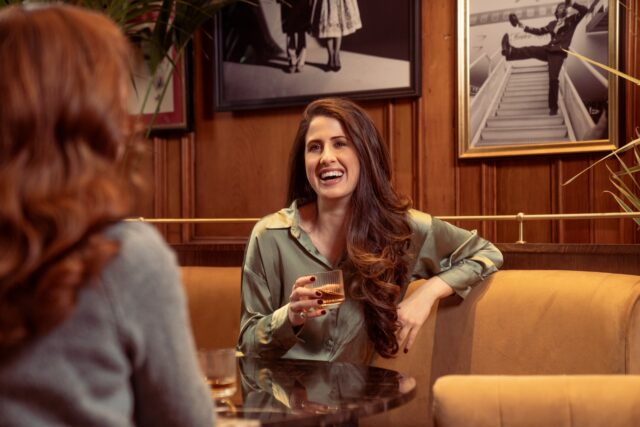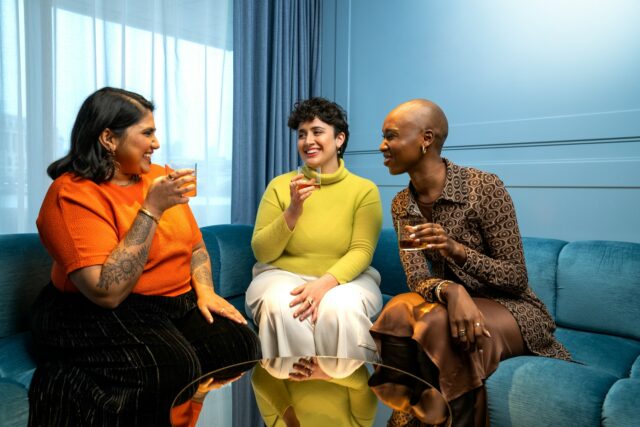Ever met someone who seems to know what you’re thinking before you even say it?

They’re not mind readers, but they are incredibly good at observing and interpreting social cues. They’re like human lie detectors, but way cooler. In reality, they’ve just honed certain habits that allow them to navigate social interactions with ease. So, what makes them so good at reading people? Here are some of the habits they have.
1. They’re all about those tiny details.

These people are like the Sherlock Holmes of social interaction. They notice those subtle shifts in facial expressions, changes in tone of voice, and even the tiniest body language cues. It’s like they’ve got a magnifying glass on your soul. They know that these micro-expressions can reveal a whole lot about what you’re thinking and feeling, even if you’re trying to hide it.
2. They’re not just listening to your words; they’re tuning into the vibe.

Good listeners aren’t just hearing the words coming out of your mouth; they’re also paying attention to the silences, hesitations, and changes in pace. It’s like they’re reading between the lines, picking up on those underlying emotions and unspoken anxieties. This allows them to connect with you on a deeper level, beyond just the surface chit-chat.
3. They’re all about seeing things from your side, no judgment.

They don’t assume they have all the answers. They’re curious about how you see the world and want to understand things from your perspective. This empathy helps them anticipate how you might react to things and tailor their communication accordingly. It’s like they’re trying to step into your shoes for a bit, just to get a feel for what’s going on in your head.
4. They’re not just acquaintances; they’re genuine friends.

They understand that trust and rapport are key to really understanding someone. They take the time to build real relationships, creating a safe space where you feel comfortable opening up. They’re genuinely interested in your life and experiences, making you feel seen and heard. It’s not just about small talk; they’re invested in getting to know the real you.
5. They’re not afraid to ask the tough questions — respectfully, of course.

These people aren’t satisfied with superficial answers. They’re curious by nature and aren’t afraid to ask questions that dig a little deeper into your thoughts and feelings. Don’t worry; they do it in a respectful and non-judgmental way. They genuinely want to understand what makes you tick, and they’re not afraid to go beyond the surface to get there.
6. They’ve got a whole library of life experiences to draw from.

The more diverse your experiences, the better equipped you are to understand the complexities of human behaviour. People who can read people well often have a wide range of experiences to draw from. They’ve interacted with people from all walks of life, cultures, and backgrounds. This exposure has given them a broader understanding of the human condition, making it easier for them to relate to and empathise with you, regardless of who you are or where you come from.
7. They’re always empathetic.

Empathy isn’t just a buzzword; it’s a skill that these people have mastered. They’re constantly trying to put themselves in your shoes, imagine what it’s like to be you, and feel your joys and sorrows. It’s like they’re walking a mile in your moccasins, so to speak. This empathy allows them to connect with you on a deeper emotional level, building trust and understanding.
8. They trust their gut, but they also check the facts.

Intuition can be a powerful tool for understanding people but it’s not always accurate. People who can read others well trust their gut feelings, but they also verify their intuitions with facts. They pay attention to the information they gather through observation, conversation, and even a little research if needed. It’s like they’re playing detective, looking for clues and connecting the dots. This balanced approach helps them avoid jumping to conclusions and ensures they get the full picture of what’s going on.
9. They’re not afraid to show their own quirks and imperfections.
 Source: Unsplash
Source: Unsplash These people understand that vulnerability can be a strength, not a weakness. They’re not afraid to share their own struggles, insecurities, and even embarrassing moments. By being open and honest about their own imperfections, they create a space where everyone feels safe to do the same. This fosters a deeper level of connection and trust, as people feel seen and understood for who they truly are, flaws and all.
10. They’re masters of mirroring and matching.
 Source: Unsplash
Source: Unsplash Ever notice how some people just seem to “click” with you effortlessly? It’s not magic; it’s often a subtle mirroring of your body language, tone of voice, and even speech patterns. Those who are good at reading people often subconsciously adopt these mirroring techniques to build rapport and create a sense of connection. It’s like speaking a secret language that your body understands, making you feel more comfortable and at ease in their presence.
11. They’re not afraid of a little awkward silence.
 Source: Unsplash
Source: Unsplash These people understand that sometimes the most powerful communication happens in the absence of words. They’re not afraid to let a conversation breathe, allowing for moments of silence and reflection. This can create a sense of intimacy and trust, as it shows that they’re not just waiting for their turn to talk, but truly listening and processing what you’re saying. These comfortable silences can also lead to unexpected insights and deeper connections.
12. They’re lifelong learners who are always curious about human behaviour.
 Source: Unsplash
Source: Unsplash People who are good at reading people never stop learning. They’re fascinated by human behaviour and constantly seek to expand their knowledge and understanding. They might read books on psychology, attend workshops on communication, or simply observe people in their daily lives. This insatiable curiosity helps them stay up-to-date on the latest research and insights into how people think, feel, and interact, making them even more adept at decoding social cues.
13. They know when to give people space and when to offer support.

They have a knack for knowing when someone needs a listening ear or a shoulder to cry on, and when they need a little space to process their emotions. They’re not afraid to offer support and encouragement, but they also respect boundaries and give people the freedom to navigate their own challenges. It’s a delicate balance, but they’ve mastered the art of being there for people without being overbearing or intrusive.
14. They’re not afraid to challenge assumptions and stereotypes.

People who are good at reading people understand that everyone is unique and complex. They don’t rely on stereotypes or generalisations to understand people; they take the time to get to know each person as an individual. They’re not afraid to challenge their own assumptions and biases, recognising that these can cloud their judgment and prevent them from truly understanding. This open-mindedness allows them to see people for who they really are, not just who they appear to be on the surface.
15. They use their powers for good, not evil.

They understand that the ability to read people comes with great responsibility. They use their skills to build bridges, foster understanding, and create positive change in the world. They might use their insights to help resolve conflicts, improve communication in relationships, or create more inclusive and welcoming environments. They recognise that their ability to connect with people is a gift, and they use it to make the world a better place, one interaction at a time.




